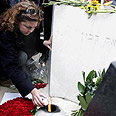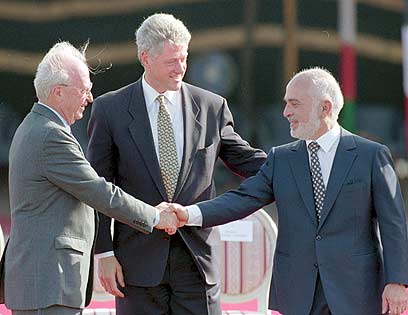
My father, Yitzhak Rabin
Ynet special: Late PM Rabin’s daughter speaks of late father, Oslo peace process
"The entire journey is presented on the walls," said the daughter of the slain prime minister. "Dad is riding in the jeep with six officers, and the entire nation stands along the road."
"Afterwards comes the funeral itself, and Noa's (Rabin's granddaughter) speech, and me crying. It's a touching speech of a girl about her assassinated grandfather. There is the loss for the nation and the trauma to Israeli democracy, but for us, it is our father and our grandfather, a man who was very central in our lives, who loved us and whom we loved."
Fifteen years later, Dalia Rabin says she firmly believes that if her father was not assassinated, the country "would have looked completely different."

Rabin signs peace deal with Jordan (Photo: AP)
"I heard from many people close to my father that on the eve of his death he considered stopping the Oslo Accords because terrorism was rampant, and he felt that Yasser Arafat was not delivering on his promises," she says. "Dad wasn't a blind man rushing forward without thought. I'm not dismissing the possibility that he was considering a u-turn... after all, he was a man who valued national security above all."
As for the Oslo Accords, she is convinced that it laid the groundwork for negotiations – even though there is no one to advocate for them anymore.
"So they say that in Oslo, they brought Arafat, gave them guns and caused the Intifada. But historical processes develop, change and flow," she said. "You can't take a person who was murdered in '95 and judge him for something that happened in 2000." After the assassination and when they said that Oslo is dead, many channels that were opened there continued to exist," she added.
'Not the peace they spoke of'
Turning her attention to Rabin's partner on the Oslo road, Shimon Peres, the late PM's daughter said she expected him to speak out more forcefully in favor of the Oslo process.
“I must say that I’m surprised to this day about Shimon Peres, who does not defend Oslo anymore. After all, he was so much in favor of it, and here and there I hear some weak remark he makes, yet he does not truly defend Oslo,” she said
However, Dalia Rabin still holds positive sentiments towards the president.
“I very much appreciate his deeds and his strength, which are simply amazing, as well as the fact that he is always willing to come anywhere, and he is always welcoming,” she said. “I think he is the right person in the right place as president. He always welcomes me and complies with any request we make. Around the anniversary of the murder, we always visit him at the Presidential residence.”
Dalia Rabin's primary concern, and the one that she believes motivated her father, is that Israel will become a bi-national state. She believes that the negotiations are focused on division of land, rather than on achieving peace, and that the final map will eventually once again reflect the borders of '67.
"They call it a peace process, but it's not the peace that they spoke of in the '90s. It's separation, with one agreement or another," she said. "They don't speak anymore about two peoples who want to cooperate and work out a system for living together. These talks are coming from a different place, and that, in my opinion, is the difference. This is where things have changed."
Rabin, still a member of the Labor Party, agrees that Prime Minister Benjamin Netanyahu aims to see Palestinian Authority President Mahmud Abbas as his partner in the negotiations.
"It seems to me it's easier to accept Abbas than Arafat," she said.
In anticipation of the 15th anniversary of Yitzhak Rabin's death, a rally is planned for Oct. 30, but word has been circulating in the media that this annual memorial event might be the last of its kind. According to Dalia Rabin, however, no such decision has been made.
"It's true that almost every year since the fifth year we have had doubts about organizing another rally, but the public confirms that our decision to continue is right," she said. "I still feel that the rally is important."
Full story published by Yedioth Ahronoth
- Follow Ynetnews on Facebook










